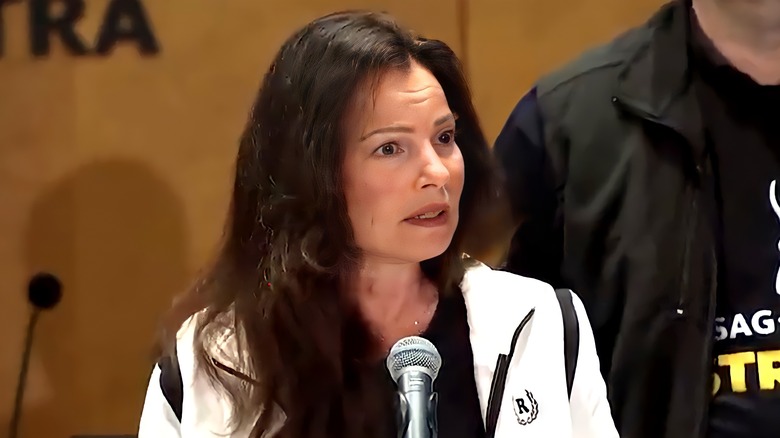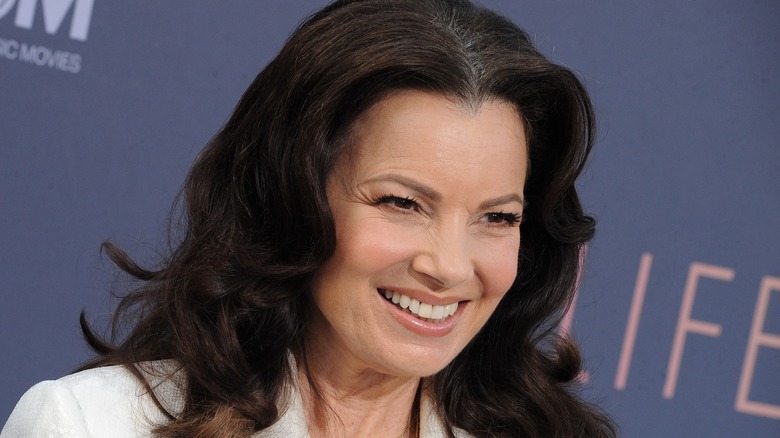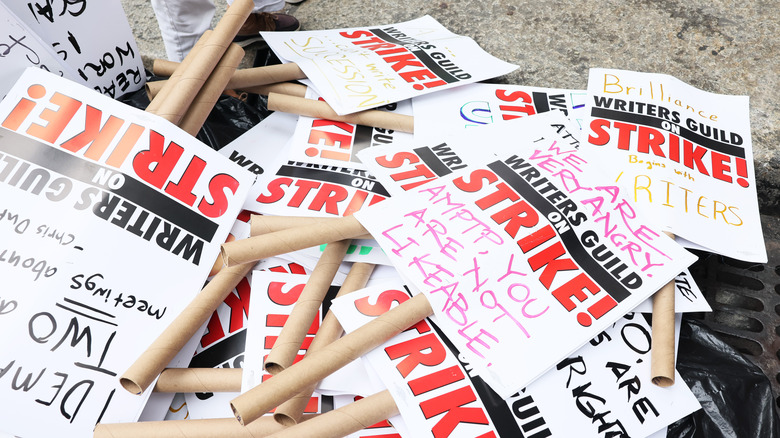SAG-AFTRA Strike Is On At Midnight - What This Means For The Entertainment Industry
After weeks of buildup, SAG-AFTRA has confirmed a strike, taking its 160,000 film and TV actors out of studios and into the streets to demand better conditions and compensation. Coupled with the ongoing Writers Guild of America strike, this constitutes the first joint strike between the groups since 1960. The SAG-AFTRA strike begins at midnight.
Tension between union members and studio executives has risen in the days leading up to the official announcement, ever since initial negotiations for a new long-term contract fell through. Just hours before the decision was made public, Disney CEO Bob Iger called the potential for a strike "very disruptive" during an appearance on CNBC's "Squawk Box." Like the WGA, SAG-AFTRA is striking for a number of improvements, including general compensation raises for working actors, revisions to the residual payment model in the streaming era, and limitations of A.I. usage moving forward.
Studios and various Hollywood executives claim to have made fair offers for a new contract to the union, but SAG-AFTRA leaders say these offers were far from equitable. The organization has cited a growing disconnect between higher-ups and working actors, which has led to untenable working conditions for actors outside the Hollywood elite.
SAG-AFTRA President says negotiations were insulting
Speaking in the wake of the strike announcement, SAG-AFTRA president Fran Drescher said that the negotiations with the Alliance of Motion Picture and Television Producers were "insulting," making connections to the larger ongoing labor movement occurring across America in recent months.
"The eyes of the world — and particularly the eyes of labor — are upon us," Drescher said (via Associated Press). "I cannot believe it, quite frankly, how far apart we are on so many things. How they plead poverty, that they're losing money left and right, while they give hundreds of millions of dollars to their CEOs. It is disgusting... At some point, we have to say no, we're not going to take it anymore." According to Drescher, the decision to strike was universally supported, saying, "We came together with the largest strike authorization vote in our union's history."
Under the conditions of the strike, no union members will be allowed to work on film or TV sets, promote current, upcoming, or old projects, or attend official events in partnership with studios, like Comic-Con. That means no premieres either — a fact emphasized when the cast of "Oppenheimer" walked away from their red carpet hours before the announcement.
"At some point, the jig is up," Drescher said. "You can't keep being dwindled and marginalized and disrespected and dishonored."
What does the SAG-AFTRA strike mean for movies and TV?
A joint strike with both SAG-AFTRA and the WGA hasn't occurred in over 60 years. The last time both unions walked out, the entertainment industry looked wildly different than it does now, which makes the coming months hard to predict. If the Writers Guild strike thus far is any indication of what's to come, though, it could be a long road.
Drescher and other leaders from both unions have made it clear that their intentions are large — reset a growing disparity that they say has allowed studios to profit while leaving working actors and writers struggling to make a full-time living. Some industry veterans have been sharing their actual compensation for major projects in recent days, like "She-Hulk" writer Cody Ziglar, who claimed to have received a residual check for his work on the series' hit Daredevil episode that paid just $396.
At this point, a number of studios seem dug in for the near future, ready to fall back on reality TV and other non-union projects to fill airtime. In May, ABC announced a fall slate devoid of new scripted programming. But it seems unlikely that the unions are willing to give up much ground, as Drescher's speech demonstrates. "What are we doing? Moving around furniture on the Titanic?" the SAG-AFTRA President said (via AP). "You cannot exist without us."


